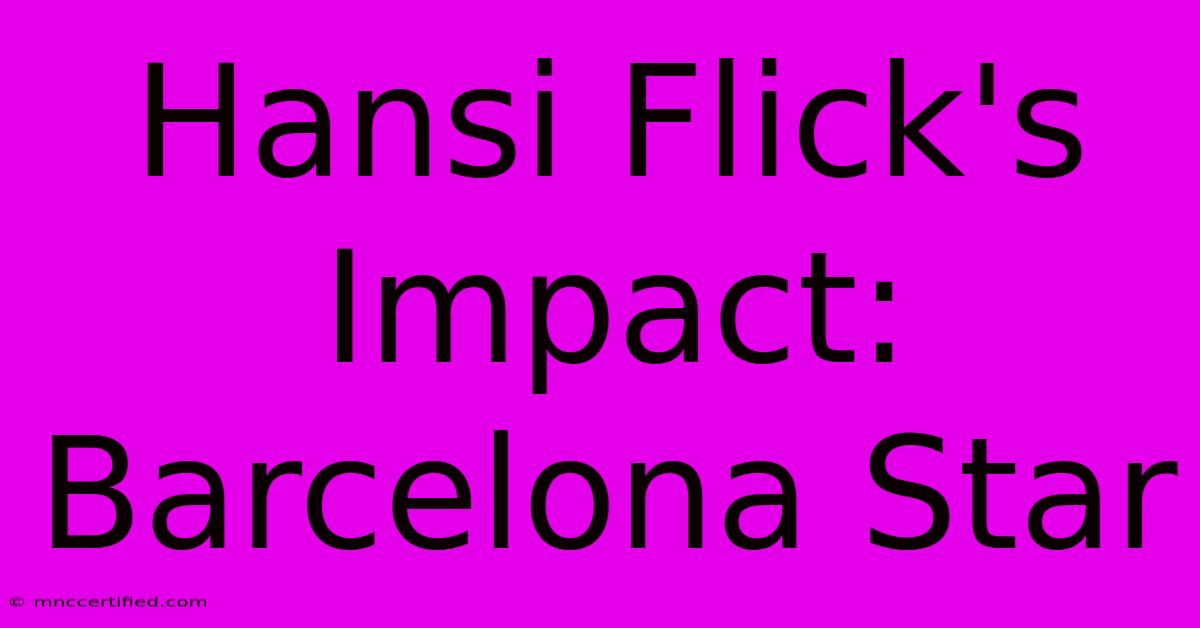Hansi Flick's Impact: Barcelona Star

Table of Contents
Hansi Flick's Impact: Reshaping the Barcelona Star
Hansi Flick's managerial career has been nothing short of meteoric. His impact, most notably felt during his time with Bayern Munich, has left an undeniable mark on the football world. While he hasn't directly managed FC Barcelona, his tactical philosophies and success have created a ripple effect, influencing how the Catalan giants approach the game and potentially shaping their future direction. This article delves into the indirect yet significant impact of Hansi Flick's style on the Barcelona star.
The Flick Philosophy: A Winning Formula
Before dissecting his influence on Barcelona, it's crucial to understand Hansi Flick's core principles. His approach is characterized by:
- High Pressing and Aggressive Gegenpressing: Flick's teams are renowned for their relentless pressing, forcing errors and winning back possession high up the pitch. This high-intensity style disrupts opponents' build-up play and creates numerous scoring opportunities.
- Fluid Attacking System: He emphasizes fluidity and movement, both off and on the ball, encouraging his players to interchange positions and create overloads in attacking areas. This makes his teams incredibly difficult to defend against.
- Tactical Flexibility: Flick isn't afraid to adapt his system depending on the opposition. He seamlessly switches between formations and tactical approaches to exploit weaknesses and gain a competitive advantage.
- Player Development: Flick is known for his ability to nurture young talent and improve players' performances. He fosters a strong team spirit and environment where players feel confident and empowered.
Flick's Indirect Influence on Barcelona: A New Era?
While not directly involved with Barcelona, Flick's success has undoubtedly influenced the club's thinking in several ways:
1. Emphasis on Pressing and Intensity:
Barcelona, under previous managers, sometimes lacked the intensity and pressing needed to compete at the highest level. Flick's success with high-pressing systems highlights the effectiveness of this approach and might be inspiring Barcelona to adopt a more proactive and aggressive playing style. We see hints of this shift in recent Barcelona matches.
2. Fluid Attacking Play:
Flick's fluid attacking system, characterized by constant movement and positional interchanges, resonates with the traditional Barcelona DNA. The emphasis on quick passing, intricate build-up play, and creating chances through movement aligns with the club's historical identity, possibly encouraging a return to a more attacking-minded philosophy.
3. Youth Development Focus:
Flick's success in developing young players at Bayern Munich could be a template for Barcelona's La Masia academy. Barcelona's focus on youth development might be influenced by Flick’s proven ability to integrate young talent seamlessly into a winning team, leading to a greater emphasis on nurturing homegrown talent.
4. Tactical Adaptability:
Flick's tactical flexibility showcases the importance of adapting to different opponents. For Barcelona, this could mean embracing a more varied approach, moving away from a rigid system and employing different strategies based on their opponents' strengths and weaknesses.
The Future: A Flickian Barcelona?
While a direct appointment of Hansi Flick is pure speculation, his influence on the broader football landscape, and specifically on how top clubs approach the game, is undeniable. The future may see Barcelona increasingly adopting elements of Flick's tactical philosophy, leading to a more intense, fluid, and ultimately, more successful team. This potential shift highlights the far-reaching impact of a successful manager's approach, even when that manager isn’t directly leading the team in question. The Barcelona star, therefore, might be subtly but significantly reshaped by the legacy of Hansi Flick's success.
Keywords: Hansi Flick, Barcelona, Bayern Munich, tactical philosophy, gegenpressing, high pressing, fluid attacking system, player development, La Masia, tactical adaptability, football management, football tactics, managerial influence, FC Barcelona, German football, Spanish football.

Thank you for visiting our website wich cover about Hansi Flick's Impact: Barcelona Star. We hope the information provided has been useful to you. Feel free to contact us if you have any questions or need further assistance. See you next time and dont miss to bookmark.
Featured Posts
-
Pregnant Megan Foxs Distress After Machine Gun Kelly
Dec 12, 2024
-
Arsenal Vs Monaco Odds And Best Bets
Dec 12, 2024
-
How To Stream Dortmund Vs Barcelona Today
Dec 12, 2024
-
Megan Fox Mgk Their Relationship Ends
Dec 12, 2024
-
Postecoglou Accepts Romero Apology
Dec 12, 2024